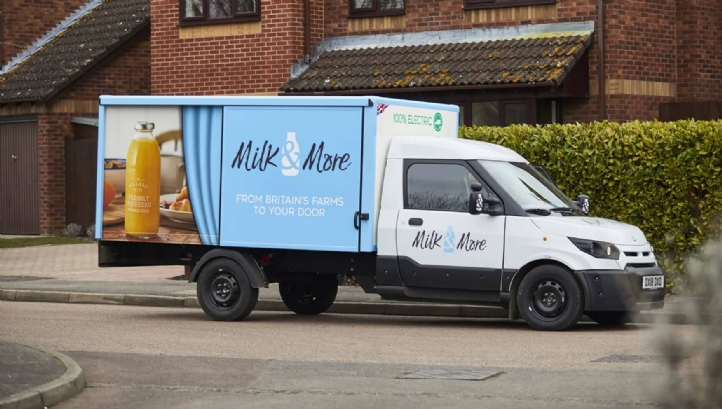Food and drink delivery firm Milk & More is set to add a further 160 fully electric vans to its UK fleet by the end of May, bringing its total electric van stock to more than 500 vehicles.

Milk & More has installed dedicated EV charging points at 25 of its distribution centres to support the electrification of its fleet
Each of the new vehicles will have a top speed of 80mph and a range of 125 miles per full charge, with Milk & More claiming that its investment in the vans will make it the largest commercial electric vehicle (EV) fleet operator in the UK. The company currently owns and operates almost 400 EVs, with the additional vans set to push this figure past the 500 mark for the first time. Its overall fleet consists of around 1,200 vehicles.
Milk & More believes that the 500+ vehicles in its electric van fleet will collectively travel more than 14 million miles each year, enabling its 1,100 delivery staff to bring grocery deliveries to its 50,000 customers with zero emissions. In total, the fleet is set to mitigate the use of 3.4 million litres of diesel by the company annually.
“Nearly 100 years on since the first floats graced British streets, the electric milk float is making an upgraded resurgence,” Milk & More’s deputy chief executive Andrew Kendall said.
“We are passionate about keeping the welfare of our planet at the forefront of our mission and we are continuing to pave the way for environmentally friendly and sustainable delivery vehicles.”
The move from Milk & More comes after the company ordered 200 StreetScooter electric delivery trucks from German postal firm Deutsche Post last year. The vehicles, which are powered by 30kW electric motors, have a range of up to 80 miles and a load capacity of 710kg.
In order to support the electrification of its fleet, Milk & More has installed dedicated EV charging points at 25 of its distribution centres.
Electric feel
As concerns surround carbon emissions, air pollution, changing policies and the cost of operating traditional vehicles continue to spur the business transition to low-carbon fleets, Milk & More is just one of many UK food and drink firms moving to electrify its delivery vehicles.
Hovis, for example, introduced its first all-electric vehicles into its delivery fleet in a bid to reduce air pollution in urban areas in October 2018, while supermarket giants Sainsbury’s and Co-op have turned to e-cargo bikes to decarbonise their last-mile deliveries. This e-cargo bike model could soon become commonplace for food and drink firms in London, after Transport for London (TfL) launched its “Bikes for Business” scheme last week.
The takeaway delivery sector has also gotten involved with the EV revolution in recent times. Last year Just Eat partnered with e-bike manufacturers Eskuta to offer a 45% discount on electric scooters for food deliveries for its restaurant partners. Companies can save around £750 on the vehicles, which usually cost in excess of £1,400. Similarly, Deliveroo this month opened a zero-emission scooter hire platform to its London-based riders.
This action comes at a time when transport is considered the UK’s most-emitting sector. It overtook the power industry as the most carbon-intense sector in 2016, and saw its emissions rise by 2% last year, with the main source of emissions deriving from the use of petrol and diesel.
Sarah George
